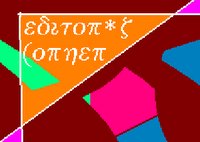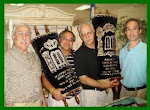 The President of the Orthodox Union recently visited Charleston, SC, on a tour of 10 selected smaller Jewish communities around the US and Canada. For his current term, the president wishes to reach out to these 10 communities and support them to make them centers of Jewish growth outside of the nation's current major Jewish centers. The focus of this effort is based on fostering community as the means to achieving an environment in which the Jewish people do more than survive: the key is for Klal Yisrael to thrive.
The President of the Orthodox Union recently visited Charleston, SC, on a tour of 10 selected smaller Jewish communities around the US and Canada. For his current term, the president wishes to reach out to these 10 communities and support them to make them centers of Jewish growth outside of the nation's current major Jewish centers. The focus of this effort is based on fostering community as the means to achieving an environment in which the Jewish people do more than survive: the key is for Klal Yisrael to thrive.Why is Charleston one of the 10 selected communities? Because it is seen by the OU as a community with potential. It is a small city which is often included in national lists - the last that comes to my mind was Time magazine's - "great cities for retirement" (see also). Charleston has charm, history, beaches, the water, a symphony orchestra, Spoleto and more. From the Jewish perspective, it has AHA and Brith Sholom Beth Israel, with at present 3 possible areas in the city and suburbs that Orthodox Jews considering a move here may choose from. With all that Charleston has to offer, the OU is ready to facilitate outreach efforts to publicize our community through this program.
The OU President spoke a number of times in Charleston. I heard him after Shabbat at a gathering of BSBI members in a private residence. On this occasion he also presented a word of caution in regard to the "disputes" that have taken place within BSBI over the last 2 - 5 years. He said the OU will be a partner in building community in Charleston, provided the "disputes" are settled soon. If not, he stated clearly that he and the OU would simply withdraw its offer of participation in this.
In the national context, the OU's program facilitating community development is an excellent idea. As I have indicated previously in the EC Forum, strengthening the Jewish people in Charleston is a community mission. In fact, Charleston is a leading community in the way its 3 congregations, Orthodox, Conservative and Reform, have cooperated over the years - all are partners in the Jewish Community Center, Addlestone Hebrew Academy and the CJF. The rabbis of these congregations have participated together at community events and Jewish Study programs at the college. Further, over the years, the rabbis have studied with one another and have long fostered an atmosphere of mutual respect. There are few communities in the world that measure up to this.
However, in recent years, BSBI has taken positions that are manifestly unsupportive of "building community". This is relevant in two key areas - BSBI's response to its "location issue" and BSBI leadership support for the JCC. (Those who are interested in the details may read through the archives of postings to the Forum.) What the President of the OU needs to address is what this means for the OU's program of national growth.
To state it simply: The OU wants to nurture community. BSBI, the single OU affiliate in Charleston, has reneged on building community. How does the OU respond to this meaningfully? What does the OU / the President have to say to those of us who have worked to build community constructively and in all good faith? Telling us that we have to fix these "disputes" is not a respectful response. It is simply not in our hands. As individual members of the OU, we deserve better.
And there is a deeper issue to consider here, which relates to what the President of the OU characterized as our "disputes". As everyone surely knows, the OU is an organization of religious standards. I do not mean just Kashrut, though certainly that is what the OU is best known for. There must be more to it. I am quite certain that in order to belong to the OU, Orthodox Congregations have to meet certain religious standards. Judaism is many things, but if nothing else, it is a religion of laws. What concerns me, and what I believe should concern everyone, is that adherence to religious laws should pertain not only to ritual, but also to governance and the conduct of "shul business" - this is an issue that touches the core of Jewish values. Now, I am not naïve. The likelihood of the OU President taking any meaningful action is slim-to-none. But if we cannot ask the OU this, then whom can we ask? Given the corruption of democratic processes by the lay leadership of BSBI, and the continual breach of trust and good faith of the past 2 or more years, when the highest official of the OU comes to speak to us, he should have more to say, and he has more to do than we have seen to this point.
In regard to the OU program of outreach, I believe all should be in full support both nationally and locally. However, if any endeavor is to succeed, it needs local parties to buy-in and be empowered. BSBI has to this point reneged on commitment to the process. In contrast, the New West Ashley Minyan is a grass-roots phenomenon; a group of people committed to building community, and to doing so where there is a real chance of growth and success. WAM is about empowering people whose needs and aspirations have been all but ignored by BSBI's lay leadership.
If the OU is intent on being an agent of progress and growth, then it must also be an agent of change, and it must do so without compromising the values and teachings of Judaism. I believe the OU is obliged to take action regarding BSBI's governance issues, or it risks being irrelevant in Charleston. And until such time as BSBI corrects the corruption of its processes, and returns to the community table as a full, honorable and committed partner, any real prospects for the growth of Orthodox observance in Charleston, and for the general strengthening of the city's larger Jewish community, will reside outside of BSBI.
Peter Rosenthal



No comments:
Post a Comment